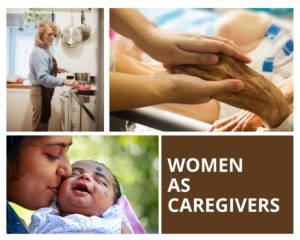Trivia Question: In heterosexual married couples where both partners work full time, women spend ____ % more time caregiving than men.
Answer: 40.
When I think of caregivers, I think of my paternal grandma, who’s dedicated herself to my grandpa’s care for as long as I can remember, ever since he’s had difficulty walking. I think of my mother, a living reminder that housewives work their asses off just as much as career-women. I think of my best friend, studying rigorously so she can become a nurse.
Caregiving, whether its paid or unpaid, professional or personal, is hard work. I will forever have respect for caregivers, because they go above and beyond to help their fellow humans. It takes a special kind of person to be patient and disciplined enough to be a good caregiver. Caregiving, if you weren’t aware, is a broad term that covers those who “provide care to people who need some degree of ongoing assistance with everyday tasks on a regular or daily basis” (CDC). A caregiver can be someone hired to take care of a stranger, or an unpaid person taking care of a family member, friend, or loved one. Up to 81% of all caregivers, formal and informal, are female, and they may spend as much as 50% more time giving care than males. Even in heterosexual relationships where both partners work full time, women still spend a whopping 40% more time caregiving than their male partner.
So, why do women shoulder such a heavy share of the caregiving compared to men? If you yourself are a woman, you already know the answer: it’s what’s expected of us. This isn’t to say that caregiving and homemaking isn’t just as important as more traditional careers, or even that there aren’t women who love doing it. However, it would be outright wrong to say that that 75% number isn’t partly due to a sense of obligation. It was only as recently as WWII that the United States began to change its perception of women as primary caretakers. In those days, the nuclear model of family demanded that women stayed home to cook, clean, and watch the kids, while their husbands went off and did important man things, like selling vacuums door to door, committing tax fraud in the office, and whatever else businessmen did in the 50’s. You’d think things would have changed more by 2022, but a lot of women are instilled with an obligation/duty to take care of others, whether it’s their children, husband, parents, or someone else.
This month, let’s recognize the women in our lives who are caretakers. Better yet, let’s do it all year long. If you’re a caregiver yourself, thank you. Thank you for your hard work, dedication, and time you give to others.
